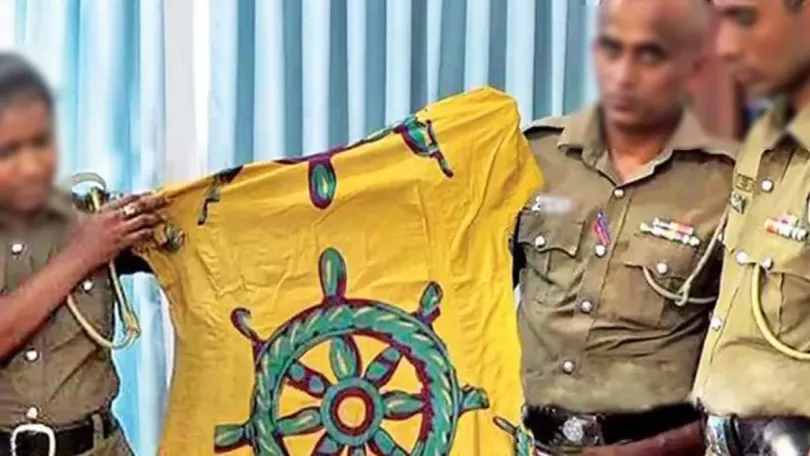Image: Police displayed the dress Abdul Rahim Masahina was wearing as a Buddhist symbol of Damma Chkra, though it was a picture of a ship’s rudder.
Sri Lanka’s top court delivers a landmark ruling in favor of Abdul Rahim Masahina, arrested in 2019 over a misidentified symbol on her clothing.
Background
In May 2019, Abdul Rahim Masahina, a resident of Kolongoda, Hasalaka, was arrested by the Hasalaka Police over allegations of insulting Buddhism. The arrest was prompted by a dress she wore, which police officers—reportedly under the influence of Sinhala Buddhist nationalist fanatics—mistakenly claimed bore the Dharma Chakra symbol. In reality, it depicted a ship’s rudder, a detail consistently highlighted by rights advocates at the time.
Inspector Chandana Nishantha, then the Officer-in-Charge of the Hasalaka Police Station, carried out the arrest. At the time, Sri Lanka was grappling with heightened religious sensitivities following the Easter Sunday bombings, further complicating the social implications of the case.
Masahina filed a Fundamental Rights Petition before the Supreme Court, asserting that her arrest and subsequent detention were unjust and violated her basic human rights.
Supreme Court Verdict
On July 30, 2025, a three-member bench of the Supreme Court—Justices Yasantha Kodagoda, Kumuduni Wickramasinghe, and Shiran Gunaratne—delivered a historic ruling.
The Court found that Inspector Nishantha had indeed violated Abdul Rahim Masahina’s fundamental rights. It ordered the following:
- Compensation: Inspector Nishantha must personally pay Masahina Rs. 30,000. The Inspector General of Police (IGP) was directed to certify that public funds would not be used to fulfill this payment.
- Policy Reform: The IGP was instructed to issue a formal circular to all police stations, clarifying guidelines for arrests under Article 3(1) of the International Covenant on Civil and Political Rights (ICCPR), with the approval of the Attorney General.
Social and Legal Significance
This ruling marks a significant milestone for fundamental rights jurisprudence in Sri Lanka. It reaffirms that law enforcement officers must act within the bounds of reason and fairness, especially when navigating sensitive religious or cultural contexts.
The verdict underscores the need for:
- Fair, evidence-based investigations prior to making arrests.
- Transparency and impartiality in police conduct.
- Safeguards against the misuse of legal provisions to target religious or ethnic minorities.
The decision sets a precedent aimed at preventing discriminatory enforcement of laws and reinforcing the balance between personal liberty and societal sensitivities.
The Human Cost: Beyond Compensation
For Masahina and her family, the consequences of the arrest were profound. The stigma, psychological trauma, and social ostracization endured over six years cannot be undone by a modest financial award.
This incident inflicted lasting damage on her dignity, mental well-being, and the lives of her children. As a Muslim woman in Sri Lanka’s Buddhist-majority society, Masahina faced not just legal misjudgment but also cultural alienation.
A formal apology from both the state and police—though absent from the Court’s directive—is morally imperative. Such an apology would be more than symbolic. It would acknowledge the personal toll of systemic failure and reaffirm Sri Lanka’s commitment to justice, pluralism, and equal protection under the law.
( Adopted from a Sinhala language article by Sampatha Samarakoon, Editor, Vikalpa Web site)
